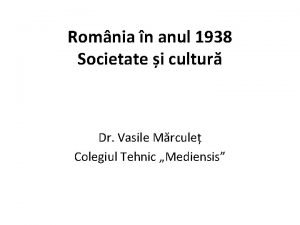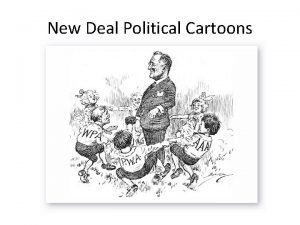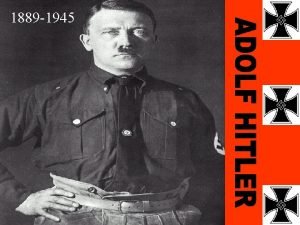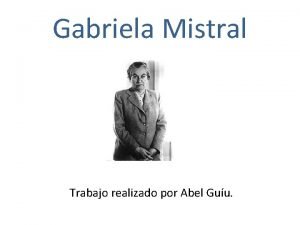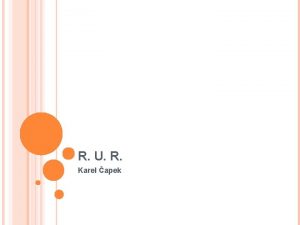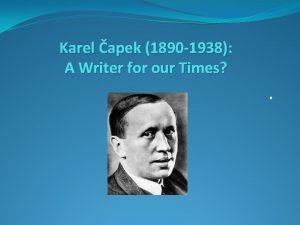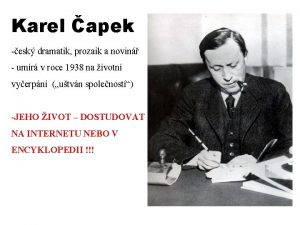Karel apek 1890 1938 A Writer for our















- Slides: 15

Karel Čapek (1890 -1938): A Writer for our Times? •

Karel Čapek (1890 -1938): A Writer for our Times? CRITICISM: • Čapek „didn´t really understand the nature of evil“ • „was unoriginal, pedantic“ • „was an optimist, was out of touch with reality“ • „instinctively was an anti-Semite“ • „was anti-intellectual“

Karel Čapek (1890 -1938): A Writer for our Times? IS ČAPEK´S WRITING STILL TOPICAL? • His formative years: Austro-Hungarian Empire • Traumatic experience of First World War • Analysis of political relations under imperialism: - topical again today

Karel Čapek (1890 -1938): A Writer for our Times? DID ČAPEK BELIEVE IN PROGRESS? • Was Čapek the victim of „struthious escapism“? • Did he believe that future will always be better? FOR ČAPEK, CIVILISATION IS ALWAYSON THE BRINK OF DESTRUCTION (Impact of the First World War trauma)

Karel Čapek (1890 -1938): A Writer for our Times? WHAT ČAPEK WROTE: • The short story line (Boží muka, Trapné povídky, Povídky z jedné a druhé kapsy, Devatero pohádek, journalism) • The utopias (RUR, Věc Makropulos, Továrna na Absolutno, Válka s Mloky, Bílá nemoc) • The „noetic“ line (Hordubal, Povětroň, Obyčejný život; Život a dílo skladatele Folýna)

Karel Čapek (1890 -1938): A Writer for our Times? BOŽÍ MUKA (WAYSIDE CROSSES) (1917): • noetic uncertainty • lyrical, fragmentary, expressionist texts • latent horror of the „beastly“ aspects of Man • The truth is unknowable • Alienation, grotesqueness • People´s motivation is hidden; sexual urges

Karel Čapek (1890 -1938): A Writer for our Times? TRAPNÉ POVÍDKY (PAINFUL STORIES) (1921) • well constructed social critical narratives • sex and sexual relations are strongly present • also greed, selfishness

Karel Čapek (1890 -1938): A Writer for our Times? ČAPEK´S STOCK IMAGES: • Boys sit of fathers´shoulders • Women touch their men with a shoulder, put fingers through their hair • Soldiers sleep in dirty railway stations (war) • Nature is observed intensely • „intimately buzzing lamp“ - coziness • concrete experiences/facts lead to contemplation • fear of the underclass – thin veneer of civilisation

Karel Čapek (1890 -1938): A Writer for our Times? KRAKATIT (1924): • A science-fiction theme is a point of departure for philosophical contemplation • A dramatic, lyrical evocation of a nightmarish militaryindustrial complex in the era of imperialism • Power is still held by the aristocracy • Strong erotic line; but love is always unsatisfactory

Karel Čapek (1890 -1938): A Writer for our Times? RUR (1921) • importance of the sexual motif • expressionist elements, horror of First World War, • precarious balanc between existence and destruction • but the existence of females saves civilisation ( • Čapek foresaw human cloning, decrease in fertility men) in

Karel Čapek (1890 -1938): A Writer for our Times? TOVÁRNA NA ABSOLUTNO (THE ABSOLUTE AT LARGE) (1922) • „newspaper novel“ • carburettor breaks down matter, releases energy and God • religious intolerance – wars • parody of churches, governments, journalists, scholars • „We should tolerate other faiths because they are held by human beings. “

Karel Čapek (1890 -1938): A Writer for our Times? VÁLKA S MLOKY (THE WAR WITH THE NEWTS) (1936) • a more mature re-working of RUR and Továrna na absolutno • a scathingly ironic novel • a parody of the selfishness of governments, scholars, journalism, business • There is no impartiality, no fairness • Local canons of values are based on nationalist misconceptions

Karel Čapek (1890 -1938): A Writer for our Times? HORDUBAL, POVĚTROŇ, OBYČEJNÝ ŽIVOT (HORDUBAL, METEOR, AN ORDINARY LIFE) (1933 -34) • „multiple mirroring“ – retelling the same facts and events from different subjective points of view, anticipating Kundera • „reality is unknowable“ • links to Boží muka and Krakatit • in Obyčejný život, startling revelations about paedophile practices and the „dark side“ of the human personality

Karel Čapek (1890 -1938): A Writer for our Times? BÍLÁ NEMOC (THE WHITE DISEASE) (1937) • the disease is can be seen as a moral affliction • the book cannot be construed as propaganda for peace • elements of existentialism (fear of death) • anticipating Havel – everyone is part of the system, even the dissidents

Karel Čapek (1890 -1938): A Writer for our Times? TO SUM UP: • Čapek´s writing is rooted in Austria-Hungary, but: • he was a keen observer and has described a number of mechanisms still at play today • His writing conveys an acute feeling of the precariousness of the human condition • It displays influences of Freud and existentialism • It anticipates postmodernism
 Utopistický román
Utopistický román Kirjandusrühmitus
Kirjandusrühmitus Merton strain theory 1938
Merton strain theory 1938 Romania in anul 1938
Romania in anul 1938 1982-1938
1982-1938 Hva er landsmål og riksmål
Hva er landsmål og riksmål Kovani novac kraljevine jugoslavije 1938 vrednost
Kovani novac kraljevine jugoslavije 1938 vrednost Fdr new deal political cartoon
Fdr new deal political cartoon 1938 stroomstoten
1938 stroomstoten Rebecca 1938
Rebecca 1938 1900 oldsmobile
1900 oldsmobile 1938 time man of the year
1938 time man of the year Map of german aggression wwii
Map of german aggression wwii Impormasyon tungkol sa ikalawang digmaang pandaigdig
Impormasyon tungkol sa ikalawang digmaang pandaigdig 1938 - tala y todas ábamos a ser reinas
1938 - tala y todas ábamos a ser reinas 1938 presidential stamps
1938 presidential stamps



